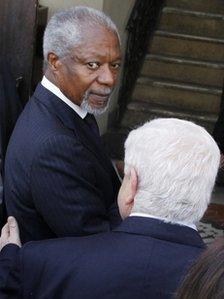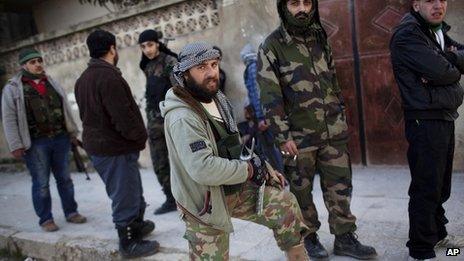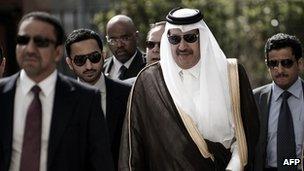Syria crisis: Kofi Annan's Mission Impossible
- Published

Kofi Annan wants a ceasefire and greater access for humanitarian aid
As the special UN-Arab League envoy Kofi Annan embarked on what looked like a Mission Impossible that was unlikely to produce swift results, the way ahead in Syria was shrouded in the smoke of war.
But amidst the many confusions and complexities, there were a few elements that could be taken as givens unless something changes dramatically.
President Bashar al-Assad and his associates will continue the campaign they launched in late January to crush all armed resistance and secure the country's borders against the infiltration of fighters, guns and money.
Accepting a ceasefire that fell short of that, would not only put on a level footing what the regime regards as armed terrorists implementing a foreign plot, but would also risk seeing large tracts of the country slipping permanently out of its control.
For the same reasons, any access for humanitarian aid will have to happen in co-ordination with the Syrian authorities.
Damascus would see the establishment of cross-border aid corridors giving independent and unrestricted access to trouble spots as an unacceptable infringement of its sovereignty.
In these key positions, the regime seems to enjoy solid and crucial support from both Russia and China.
So there will be no immediate ceasefire, nor will blanket permission be given for aid deliveries outside regime control.
No compromise in sight
All that is quite apart from the positions adopted by most of the Syrian opposition, which also make an early peaceful solution look unlikely.
Most groups refuse to consider talking to the regime - or at least President Assad - because so much blood has been spilled in ruthless repression that continues on the ground.
Most activists simply want the downfall of the regime, not some compromise that would allow it to survive in a perhaps only slightly mutated form.
They would see negotiations now as being from a position of weakness, especially given the regime's aggressive reassertion of military control since late January.
Mr Annan also finds himself in the anomalous position of representing an Arab League which has thrown its weight behind regime change too.
The League's 22 January resolution, which triggered the regime's crackdown, drops all mention of dialogue with Damascus, prescribes a menu for political change starting with President Assad handing power immediately to his deputy, and gives political cover for Arab states to provide military and other support to the opposition.

Most opposition activists simply want the downfall of the regime, not a compromise
That formula worked in Yemen. But Syria is not Yemen.
The Arab League position is also supported by most of the Western powers and their allies.
That is sharply at odds with the balanced positions adopted by Kofi Annan himself, who insists that any political solution must involve dialogue with all the "actors" on the ground, necessarily including the regime.
He is against arming the opposition or any form of outside military intervention, arguing that they will complicate an already drastic situation.
On paper at least, that actually puts him closer to the Russian and Chinese positions than to those of the Western powers.
He will have to draw on all his considerable skills and experience if he is to find common ground between these polarised stands.
Clearly, that is going to take time, if it is indeed attainable.
Civil war?
If Mr Annan is to stand a chance of producing a peaceful political solution, he would have to persuade the Saudis, Qataris and other key players in the Arab League, and indeed the West, that pushing for regime change is going to plunge Syria and the region into deeper chaos.
The West, also set on regime change, finds itself casting around with few valid options for bringing that about swiftly and surely.
Nato and its member powers have from the outset ruled out external military intervention as in Libya, and they continue to do so for a wide variety of compelling reasons - despite the hopes of many Syrian opposition groups that they can somehow be drawn in.

Qatar's Prime Minister has been pushing for Arab military intervention in Syria
The West is also wary of pouring arms into the opposition, for fear of fuelling a sectarian civil war in which Sunni Islamist radicals could come to the fore - especially since al-Qaeda has begun urging jihadis to join the fray, raising anxieties on which the regime has skilfully played.
The Western powers' strategy of economic and political sanctions has helped isolate and pressure the regime.
It is certainly feeling the pinch, as the value of the Syrian pound plummets, cash flows dry up, and industry and tourism grind to a halt.
But as Iraq showed, such pressures can continue for years without necessarily bringing about the desired result.
Regime's game
The Syrian opposition, still badly fragmented both politically and militarily, also finds itself in a bind.
After months of ruthless repression, and the years that preceded it, taking up arms is a natural development, and one which has inflicted a cost on the regime.
But it is also playing the regime at its own game and engaging in a confrontation which the rebels could only hope to win decisively with the kind of outside intervention that tilted the balance so abruptly against Col Muammar Gaddafi in Libya.
Imagine what the situation might be there now, had Nato not intervened, and that might give some idea of what may lie ahead in Syria.
If Kofi Annan cannot induce major shifts in position on the part of many of the key players in this bloody and convoluted drama, the most likely scenario will be this:
The regime will complete its crushing of armed resistance wherever it finds it, with much of the immediate focus shifting north-westwards to Idlib province and the borderlands with Turkey.
But it will continue to face a low-level insurgency as well as civil protest in many (mainly Sunni) areas, where it has clearly lost the hearts and minds of the people.
Spread of dissent
Some neighbours, especially Turkey, may become increasingly permissive in terms of allowing the cross-border fuelling of insurgents.
And some Arab states, notably the Saudis and Qataris, may become more assertive and open in arming and financing the rebels, while the Western powers continue their efforts to unify the opposition and provide its military wing with non-lethal assistance.
This route could still lead to a collapse of the regime as its fabric slowly unravels, with accelerated military defections, the gradual spread of dissent and the worsening of economic and social conditions.
But, while there could be surprises, it risks being a long and brutal process which might tear the country apart at the seams - along fault-lines which run through the wider region.
It has in it the already apparent seeds both of a Syrian sectarian civil war and of the kind of regional and international proxy conflict which consumed neighbouring Lebanon for decades and which is still latent there.
The regime may ultimately be doomed, but the fact is that it retains some bedrock support not only among the party faithful but also among sections of society fearful of a plunge into the unknown.
It maintains an iron grip which has so far prevented military units defecting en masse, and it has shown every sign of determination to fight to the bitter end even if that means bringing the house down around it.
Given everything that has happened, few of the regime's domestic or external adversaries believe that the inner circle of power is genuinely prepared to envisage a graceful transition to real democracy, either through negotiations or through the regime's own reform process that should see multi-party general elections in May.
That, and all the blood, is why most of the opposition reject dialogue and regard mediation with the regime as simply buying it more time.
Kofi Annan has already won one Nobel Peace Prize.
If he can conjure a peaceful solution out of the elements he is working with now, he will surely deserve another.